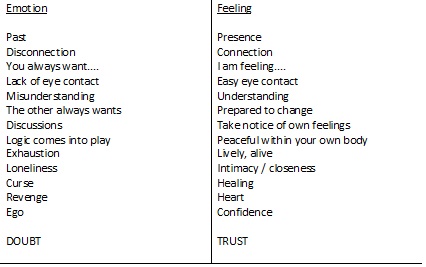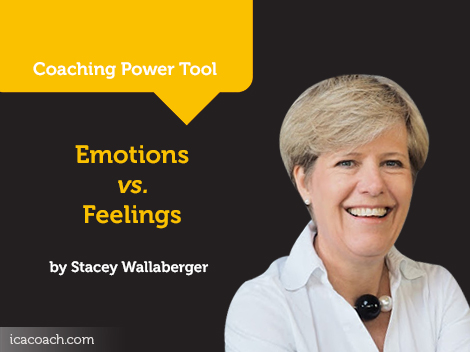A Coaching Power Tool Created by Stacey Wallaberger
(Retail Coach, SWITZERLAND)
Rather than being your thoughts and emotions, be the awareness behind them.― Eckhart Tolle, A New Earth: Awakening to Your Life’s Purpose
Our western society has been raised to hide feelings and emotions. Have you experienced witnessing someone else’s emotional outbreak be it crying, anger, shouting, fear or love. We feel really uncomfortable and find it difficult to deal with it not only on a personal level but in general. We have been conditioned to respond correctly to fit into the accepted norm. There have been many studies and papers published about this topic, this is just a molecule of the whole.
In general people are afraid of showing and feeling their feelings, we are afraid of losing control, afraid of the pain it may cause, afraid of feeling loss, afraid of failure. Therefore like ostriches we bury their heads in the sand to block out danger, the danger being confronted with our emotions.
Emotions and feelings are always there, they come and go with the mood, we cannot control them, they are what they are, by accepting them and understanding where they come from, we can learn to trust and have confidence within ourselves, finding an inner peace and becoming more balanced.
It is useful to remember that emotions control our behaviour and actions. This in turn affects our thinking and feelings.
Emotions and feelings are very present when doing business. Just think of the times when you are walking down the street and you see a wonderful item in the store window, it is a heart stopping moment and AHA you really have to have it.
Entering the store you excitedly ask to see the item. MMM its really great, you think to yourself and then the process starts ….. I love it, yes but do I need it?’, ‘It is just what I have been looking for, yes but the price?’, This is so great, yes but the quality?’, Do I really need it, …I will think about it.’
The same process is repeated in the Business world when we are connecting with different people and having to make personal decisions. Impersonal, corporate decisions are easier to make as they are based on different criteria and in many cases there are tools in place to assist choice making. But when it comes to the one on one decision we are faced with the impacting pull of feelings and the push of emotions. Why do we like working with one person and not with the other? How can we reach our optimum business performance and know when we are having a break through? Very simply the first step is to look at oneself taking recognisance of the feelings and then discovering the emotions that lie beneath it. This sounds easier than it is, as it only works if you are true to yourself and your values. The advantage is that we can change our perspectives and learn to trust ourselves better.
Feelings are something you have; not something you are.― Shannon L. Alder
In personal relationships and our daily lives we are constantly faced with choices and decisions. These are first expressed in feelings that are very much a reaction in the present. These feelings are a reflex and are generally uninhibited, unbiased but based very much in the moment; they are representative of the conscious mind.
Think back to a time in ones personal life when in a moment of intimacy we are feeling warm, careless, excited, free, happy and loved and in the next second there is a shift back to the deeper emotions, suddenly this wonderful moment has passed, logic starts to set in blocking all those feelings of trust, resulting in doubt. And what happens next…instead of giving all we can, we become so self conscious and unsure spoiling the feeling.
Here is the definition of the word feeling from: The Free Dictionary.com:
- Noun – a general state of consciousness considered independently of particular sensations, thoughts etc
- An emotional perception or attitude
Therefore feeling is an interpretation of our emotions, it is the response part fuelled on by the situation or experience, interpretation and perception.
John D. Mayer says:
emotions operate on many levels. They have a physical aspect as well as a psychological aspect. Emotions bridge thought, feeling and action – they operate in every part of the person, they affect many aspects of a person, and the person affects many aspects of the emotions.
In the world of feelings and emotions there are over 4000 descriptions and words in the English language alone. Focusing on all of them is impossible so here are a few:

When an emotion comes into play there is doubt, one feels victimised and due to insecurity, there is lack of eye contact. Having to make decisions leads to exhaustion and in extreme cases can lead to loneliness. When one feels insecure the ultra ego comes into play and this can be detrimental to your overall persona as it is not a true representation of yourself.
Feelings on the other hand are very present and by taking recognisance of the immediate situation this is also representative with the usage of ones body language. The reinforcement of ‘I am feeling good’ leads to easy eye contact with an interacting person. There is a feeling of openness, understanding which in turn builds up trust and confidence. This is only possible if you are aware of your values, underlying experiences, core beliefs and acknowledges them. Another intrinsic ingredient is also learning to trust your intuition that becomes stronger when we in turn trust ourselves more.
Acknowledging our values, core beliefs and past experiences is not easy, as many a time we are not aware of them, therefore are surprised when we react in certain situations with such strong instantaneous feelings and after the moment has passed, wonder what happened and why we reacted in such a manner with incredulous amazement. Unbeknown to us our subconscious emotions came into play.
How you react emotionally is a choice in any situation.― Judith Orloff
Reflective questions:
As a coach or even as an individual it is always good to ask the following questions, these will help you direct your focus better.
- Is your reaction one based on the present situation or is it from the past?
- What emotion are you feeling now?
- Can you relate to the situation without (anger/ frustration ….)
- What are the results of your emotion?
- Are your expectations realistic?
- What about yourself are you trying to hide?
- Is there anything threatening you?
- What do you wish you had done?
- What should you have never done?
- What do you find frustrating?
- What are you obsessed about?
- Is someone else doing things differently than what you want?
Techniques to use if the client is blocking and not able to open up is:
- Give the client something to hold or use with their hands, this helps unblock that protective closed shield.
- To ask what advice they, the client, would give to their closest friend if they were in the same situation
As Dr Maurice Elias says
Emotions are human beings’ warning systems as to what is really going on around them. Emotions are our most reliable indicators of how things are going on in our lives. Emotions help keep us on the right track by making sure that we are led by more than the mental/intellectual faculties of thought, perception, reason, memory…
We have to bear in mind at all times that we cannot change the deeper emotional unconscious state, it is and always will be there. It is by becoming more aware of why they are there, that we can reframe our perspectives and learn to understand and trust our feelings more. If we do not, a situation can finally become destructive.
Poetry is the spontaneous overflow of powerful feelings; it takes its origin from emotion recollected in tranquillity – William Wordsworth
